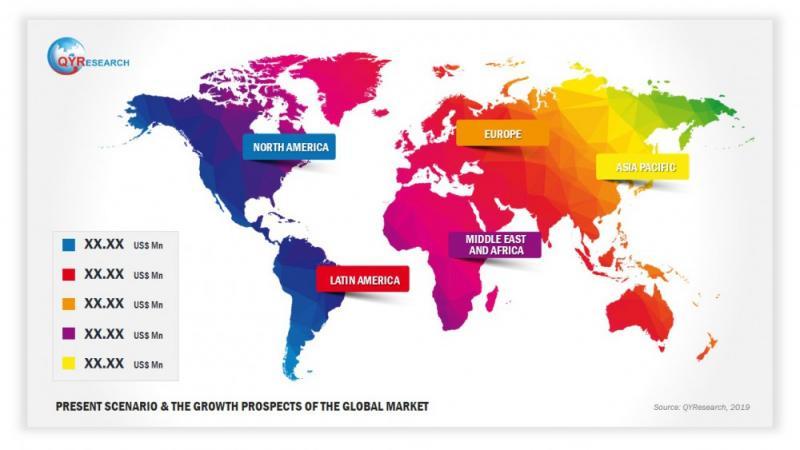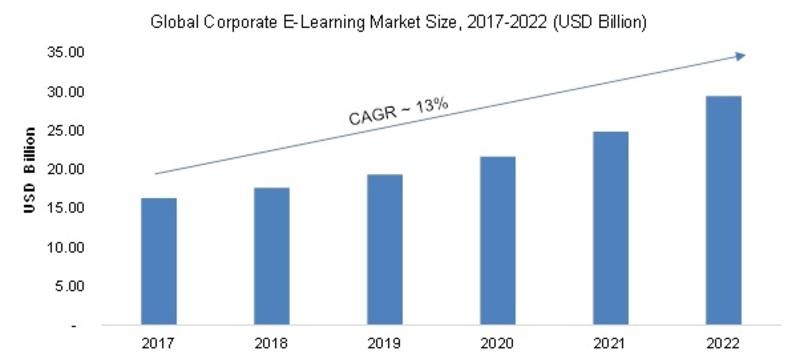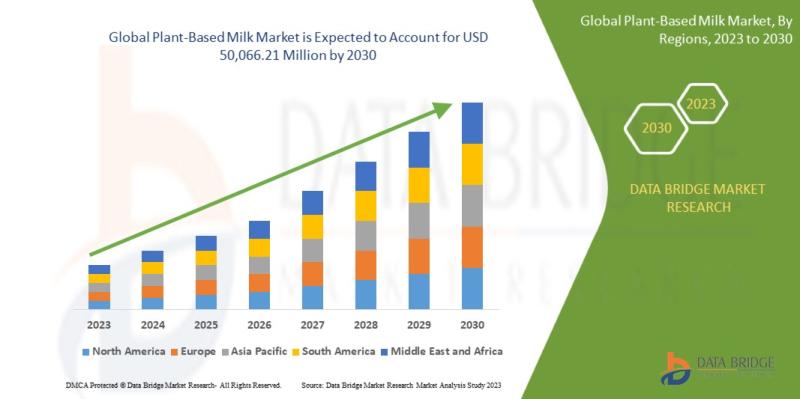Press release
Plant-Based Milk Market: A Comprehensive Overview
Introduction
The global plant-based milk market has witnessed significant growth over the past few years, driven by changing consumer preferences and growing awareness of health and environmental concerns. Plant-based milk alternatives, such as almond milk, soy milk, oat milk, and coconut milk, have evolved from niche products into mainstream options for consumers seeking dairy-free, lactose-free, and vegan alternatives. The growing demand for plant-based beverages is reshaping the dairy industry, and market players are keen to meet the rising demand with innovative offerings.
This growth can be attributed to several factors, including an increasing number of people following vegetarian, vegan, or flexitarian diets, a rise in lactose intolerance, and the mounting concerns about the environmental impact of dairy farming. As consumers look for healthier and more sustainable alternatives to traditional dairy, plant-based milk has rapidly gained popularity across various regions worldwide.
Market Size
The global plant-based milk market is expected to grow significantly in the forecast period of 2023 to 2030. Data Bridge Market Research analyses that the market is growing with a CAGR of 12.4% in the forecast period of 2023 to 2030 and is expected to reach USD 50,066.21 million by 2030. The increase in the vegan population around the globe is the key factor fueling the expansion of the plant-based milk market.
For More Information Visit https://www.databridgemarketresearch.com/reports/global-plant-based-milk-market
Market Opportunities
The plant-based milk market offers numerous opportunities for growth, with product diversification, new product launches, and expanding distribution channels being key drivers. Plant-based milk producers are continually innovating to meet the diverse needs of consumers, introducing new flavors, formulations, and nutritional benefits. The demand for fortified plant-based milk options, enriched with calcium, vitamins, and other nutrients, is gaining momentum.
One significant opportunity lies in the growing demand for plant-based milk in emerging markets such as Asia, Latin America, and the Middle East. As these regions experience shifts in consumer preferences toward more sustainable and health-conscious products, there is immense potential for plant-based milk brands to establish a strong presence.
Furthermore, the rise of e-commerce platforms provides brands with a direct-to-consumer sales model that allows for broader market reach. Digital platforms enable consumers to purchase plant-based milk from the comfort of their homes, making it easier to explore a variety of options not typically available in physical stores.
Market Share
The market share of plant-based milk is dominated by several key players, with some of the most notable brands including Silk, Alpro, Oatly, Califia Farms, and So Delicious. These companies have established strong brand loyalty and recognition among consumers. The competition is fierce, with smaller regional players also making their mark by offering unique products and catering to niche segments.
Soy milk has historically held the largest market share due to its long-standing popularity as a dairy alternative. However, recent trends show that oat milk has rapidly gained ground, particularly in Europe and North America. Oat milk is often favored for its creamy texture, versatility in various beverages, and sustainability. Almond milk remains a popular choice, with its mild flavor and low-calorie content appealing to health-conscious consumers.
As the market grows, more innovative brands are emerging, offering plant-based milk made from a variety of ingredients such as cashews, macadamia nuts, rice, and hemp. This diversification has resulted in a fragmented market, with many options catering to different consumer preferences.
Market Demand
The demand for plant-based milk is primarily driven by the increasing awareness of the health benefits associated with plant-based diets. Consumers are increasingly seeking alternatives to traditional dairy due to concerns over lactose intolerance, allergies, and ethical considerations surrounding animal welfare. Furthermore, many people are transitioning to plant-based diets as part of their efforts to reduce their carbon footprint, as dairy farming is known to contribute significantly to greenhouse gas emissions.
The rise in vegan and flexitarian lifestyles is a major driver of the plant-based milk market. As more people adopt plant-based diets or reduce their consumption of animal-based products, the demand for plant-based milk continues to rise. Additionally, the growing adoption of plant-based milk by coffee shops, cafes, and restaurants is boosting demand, as many consumers prefer plant-based milk options in their daily beverages.
Consumers are also looking for plant-based milk that is free from added sugars and artificial additives. The clean label trend has fueled the demand for simple, natural ingredients in plant-based beverages. As a result, companies are focusing on offering products with minimal ingredients while ensuring they meet the nutritional needs of consumers.
Market Trends
Several trends are shaping the plant-based milk market, one of the most prominent being the increasing popularity of oat milk. Oat milk has gained widespread attention due to its rich, creamy texture and sustainability credentials. Oat milk is considered an environmentally friendly alternative to other plant-based milks because it has a lower environmental impact in terms of water usage and land requirements compared to almond milk or soy milk.
Another trend is the rise of fortified plant-based milk, with brands increasingly adding vitamins and minerals such as calcium, vitamin D, and B12 to their products to mimic the nutritional profile of cow's milk. This trend is helping plant-based milk appeal to a broader range of consumers, including those who require fortified products for health reasons.
The growing preference for clean and natural labels is also impacting the market. Consumers are gravitating toward plant-based milk that is free from preservatives, additives, and artificial ingredients. This has led to the development of new product formulations that focus on simplicity and transparency in labeling.
Market Growth
The growth of the plant-based milk market is expected to accelerate in the coming years. This growth will be fueled by increasing consumer awareness of health and environmental concerns, the continued rise of plant-based diets, and innovations in plant-based milk products. Additionally, the COVID-19 pandemic has accelerated interest in plant-based diets as consumers focus more on their overall health and immunity.
The market is also benefiting from the increased availability of plant-based milk in mainstream retail outlets and foodservice establishments. As more grocery stores, supermarkets, and cafes expand their plant-based product offerings, the visibility of plant-based milk is improving, which in turn boosts consumer demand.
Overall, the plant-based milk market shows no signs of slowing down. With a growing range of options available to suit diverse consumer preferences and an increasing number of people making the switch to plant-based diets, the plant-based milk industry is poised for continued success.
Browse Trending Reports :
https://newsresmarket.blogspot.com/2025/02/block-chain-in-manufacturing-market.html
https://newsresmarket.blogspot.com/2025/02/retail-analytics-market-size-share.html
https://newsresmarket.blogspot.com/2025/02/location-analytics-market-size-share.html
https://newsresmarket.blogspot.com/2025/02/protein-ingredients-market-size-share.html
Contact Us:
Data Bridge Market Research
US: +1 614 591 3140
UK: +44 845 154 9652
APAC : +653 1251 975
Email: corporatesales@databridgemarketresearch.com
About Data Bridge Market Research:
Data Bridge set forth itself as an unconventional and neoteric Market research and consulting firm with unparalleled level of resilience and integrated approaches. We are determined to unearth the best market opportunities and foster efficient information for your business to thrive in the market. Data Bridge endeavors to provide appropriate solutions to the complex business challenges and initiates an effortless decision-making process.
The global plant-based milk market has witnessed significant growth over the past few years, driven by changing consumer preferences and growing awareness of health and environmental concerns. Plant-based milk alternatives, such as almond milk, soy milk, oat milk, and coconut milk, have evolved from niche products into mainstream options for consumers seeking dairy-free, lactose-free, and vegan alternatives. The growing demand for plant-based beverages is reshaping the dairy industry, and market players are keen to meet the rising demand with innovative offerings.
This growth can be attributed to several factors, including an increasing number of people following vegetarian, vegan, or flexitarian diets, a rise in lactose intolerance, and the mounting concerns about the environmental impact of dairy farming. As consumers look for healthier and more sustainable alternatives to traditional dairy, plant-based milk has rapidly gained popularity across various regions worldwide.
Market Size
The global plant-based milk market is expected to grow significantly in the forecast period of 2023 to 2030. Data Bridge Market Research analyses that the market is growing with a CAGR of 12.4% in the forecast period of 2023 to 2030 and is expected to reach USD 50,066.21 million by 2030. The increase in the vegan population around the globe is the key factor fueling the expansion of the plant-based milk market.
For More Information Visit https://www.databridgemarketresearch.com/reports/global-plant-based-milk-market
Market Opportunities
The plant-based milk market offers numerous opportunities for growth, with product diversification, new product launches, and expanding distribution channels being key drivers. Plant-based milk producers are continually innovating to meet the diverse needs of consumers, introducing new flavors, formulations, and nutritional benefits. The demand for fortified plant-based milk options, enriched with calcium, vitamins, and other nutrients, is gaining momentum.
One significant opportunity lies in the growing demand for plant-based milk in emerging markets such as Asia, Latin America, and the Middle East. As these regions experience shifts in consumer preferences toward more sustainable and health-conscious products, there is immense potential for plant-based milk brands to establish a strong presence.
Furthermore, the rise of e-commerce platforms provides brands with a direct-to-consumer sales model that allows for broader market reach. Digital platforms enable consumers to purchase plant-based milk from the comfort of their homes, making it easier to explore a variety of options not typically available in physical stores.
Market Share
The market share of plant-based milk is dominated by several key players, with some of the most notable brands including Silk, Alpro, Oatly, Califia Farms, and So Delicious. These companies have established strong brand loyalty and recognition among consumers. The competition is fierce, with smaller regional players also making their mark by offering unique products and catering to niche segments.
Soy milk has historically held the largest market share due to its long-standing popularity as a dairy alternative. However, recent trends show that oat milk has rapidly gained ground, particularly in Europe and North America. Oat milk is often favored for its creamy texture, versatility in various beverages, and sustainability. Almond milk remains a popular choice, with its mild flavor and low-calorie content appealing to health-conscious consumers.
As the market grows, more innovative brands are emerging, offering plant-based milk made from a variety of ingredients such as cashews, macadamia nuts, rice, and hemp. This diversification has resulted in a fragmented market, with many options catering to different consumer preferences.
Market Demand
The demand for plant-based milk is primarily driven by the increasing awareness of the health benefits associated with plant-based diets. Consumers are increasingly seeking alternatives to traditional dairy due to concerns over lactose intolerance, allergies, and ethical considerations surrounding animal welfare. Furthermore, many people are transitioning to plant-based diets as part of their efforts to reduce their carbon footprint, as dairy farming is known to contribute significantly to greenhouse gas emissions.
The rise in vegan and flexitarian lifestyles is a major driver of the plant-based milk market. As more people adopt plant-based diets or reduce their consumption of animal-based products, the demand for plant-based milk continues to rise. Additionally, the growing adoption of plant-based milk by coffee shops, cafes, and restaurants is boosting demand, as many consumers prefer plant-based milk options in their daily beverages.
Consumers are also looking for plant-based milk that is free from added sugars and artificial additives. The clean label trend has fueled the demand for simple, natural ingredients in plant-based beverages. As a result, companies are focusing on offering products with minimal ingredients while ensuring they meet the nutritional needs of consumers.
Market Trends
Several trends are shaping the plant-based milk market, one of the most prominent being the increasing popularity of oat milk. Oat milk has gained widespread attention due to its rich, creamy texture and sustainability credentials. Oat milk is considered an environmentally friendly alternative to other plant-based milks because it has a lower environmental impact in terms of water usage and land requirements compared to almond milk or soy milk.
Another trend is the rise of fortified plant-based milk, with brands increasingly adding vitamins and minerals such as calcium, vitamin D, and B12 to their products to mimic the nutritional profile of cow's milk. This trend is helping plant-based milk appeal to a broader range of consumers, including those who require fortified products for health reasons.
The growing preference for clean and natural labels is also impacting the market. Consumers are gravitating toward plant-based milk that is free from preservatives, additives, and artificial ingredients. This has led to the development of new product formulations that focus on simplicity and transparency in labeling.
Market Growth
The growth of the plant-based milk market is expected to accelerate in the coming years. This growth will be fueled by increasing consumer awareness of health and environmental concerns, the continued rise of plant-based diets, and innovations in plant-based milk products. Additionally, the COVID-19 pandemic has accelerated interest in plant-based diets as consumers focus more on their overall health and immunity.
The market is also benefiting from the increased availability of plant-based milk in mainstream retail outlets and foodservice establishments. As more grocery stores, supermarkets, and cafes expand their plant-based product offerings, the visibility of plant-based milk is improving, which in turn boosts consumer demand.
Overall, the plant-based milk market shows no signs of slowing down. With a growing range of options available to suit diverse consumer preferences and an increasing number of people making the switch to plant-based diets, the plant-based milk industry is poised for continued success.
Browse Trending Reports :
https://newsresmarket.blogspot.com/2025/02/block-chain-in-manufacturing-market.html
https://newsresmarket.blogspot.com/2025/02/retail-analytics-market-size-share.html
https://newsresmarket.blogspot.com/2025/02/location-analytics-market-size-share.html
https://newsresmarket.blogspot.com/2025/02/protein-ingredients-market-size-share.html
Contact Us:
Data Bridge Market Research
US: +1 614 591 3140
UK: +44 845 154 9652
APAC : +653 1251 975
Email: corporatesales@databridgemarketresearch.com
About Data Bridge Market Research:
Data Bridge set forth itself as an unconventional and neoteric Market research and consulting firm with unparalleled level of resilience and integrated approaches. We are determined to unearth the best market opportunities and foster efficient information for your business to thrive in the market. Data Bridge endeavors to provide appropriate solutions to the complex business challenges and initiates an effortless decision-making process.
Permanent link to this press release:
Copy
Please set a link in the press area of your homepage
to this press release on woodPRI. woodPRI disclaims liability for any content contained in
this release.
Recommend

/newsMicroencapsulation Market Deep Analysis on Key Players - Dow Corning, Encapsys, Syngenta Crop Protection, Evonik Industries, 3M and Bayer
Market Study Report Adds Global Microencapsulation Market Size, Status and Forecast 2024 added to its database. The report provides key statistics on the current state of the industry and other analytical data to understand the market.
Extensive research is required for choosing the appropriate cor...

/newsGermany Airbag Market Size 2023: Global Share, Industry And Report Analysis By 2030 | Hyundai Mobis Co., Ltd. Key Safety Systems, Inc. Robert Bosch GmbH
Germany airbag market is expected to grow at a CAGR of around 6% during the forecast period. Germany Airbag Market research report refers to gathering and analyzing significant market data serve as best medium for various industry players to launch novel product or service. It is vital for key firms...

/newsSecurities Brokerages And Stock Exchanges Market Outlook 2021: Big Things are Happening
A new intelligence report released by HTF MI with title "Global Securities Brokerages And Stock Exchanges Market Survey & Outlook" is designed covering micro level of analysis by Insurers and key business segments, offerings and sales channels. The Global Securities Brokerages And Stock Exchange...

/newsRenewable Chemicals Market Emerging Trends and Competitive Landscape Forecast to 2028
The renewable chemicals market was valued at US$ 80,566.30 million in 2021 and is projected to reach US$ 1,76,750.76 million by 2028 it is expected to grow at a CAGR of 11.9% from 2021 to 2028. The research report focuses on the current market trends, opportunities, future potential of the market, a...

/newsHow Coronavirus is Impacting Cold Brew Coffee, Global Market Volume Analysis, Size, Share and Key Trends 2020-2026
"Market Latest Research Report 2020:
Los Angles United States, February 2020: The Cold Brew Coffee market has been garnering remarkable momentum in the recent years. The steadily escalating demand due to improving purchasing power is projected to bode well for the global market. QY Research's lates...

/newsCorporate E-Learning Market - Global Industry Size, Share, Key Players Analysis that are Infor, SkillSoft Corporation, Adrenna, CERTPOINT Systems and others with Regional Forecast to 2022
Overview:
E-Learning is used to enhance the learning procedures for newer job requirements and to make employees sound about the internal and external changes in the market and respective organizations. This method has created considerable differences in the ways of training and developing employee...
